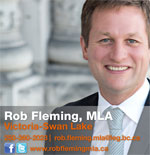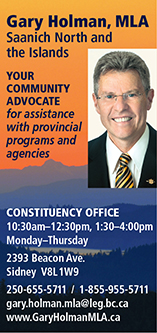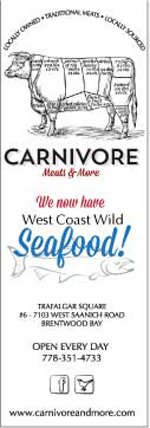Archive for June 2015

Municipal Governance: Saanich has Questions for BC Government
by Roger Stonebanks, citizen journalist
Saanich council will press the BC government for answers about any “study of governance in the region” after reworking a motion from two councillors that had used the term “amalgamation study.”
At its meeting on May 25, 2015, Coun. Colin Plant moved and Coun. Fred Haynes seconded a motion “That:
” a) Saanich write a letter to [Community, Sport and Cultural Development] Minister Coralee Oakes indicating our willingness to participate in a provincially funded amalgamation study. The letter will be developed by Mayor and Council with the assistance of staff; and
“b) Prior to drafting the letter, residents will be invited to a public meeting to provide feedback for Mayor and Council as to what should be included in the letter.”
After three amendments, two of which were successful, the following motion was approved without dissent:
“Motion as Amended:
“1. Saanich write a letter to Minister Coralee Oakes indicating our willingness, in principle, to participate in a study of governance in the region, dependent upon the Terms of Reference and nature of the study proposed. The letter will be developed by Mayor and Council with the assistance of staff; and
“2. Prior to drafting a letter to Minister Coralee Oakes, residents will be invited to a public meeting, to be scheduled at the earliest opportunity, to provide feedback for Mayor and Council as to what should be included in the letter.”
The minutes of the council meeting can be found on the Saanich website – Public input is on
pages 6 and 7 and council’s debate is on pages 9 to 12.
In a statement to Saanich Voice Online on April 24, 2015, Oakes also did not use the word “amalgamation.” She said:
“The Ministry of Community, Sport and Cultural Development is in the process of considering how best to proceed regarding the results of the referenda in the Capital Region.
“The Ministry sees an opportunity to support a conversation on governance and service integration and has heard from some Mayors and Councils but needs to hear from others to gauge interest and better understand how to collaborate on this goal.
“Decisions about potential next steps will come out of the Province’s considerations and future discussions between local governments and the provincial government.”
Oakes elaborated at the BC legislature on May 6, 2015. She referred to “this conversation on governance and services” and stated: “That conversation can’t solely be focused on amalgamation as a solution. It needs, instead, to have a broader dialogue about governance and service integration so that all municipalities can be involved.”
She repeated previous comments including that the BC government is “considering how best to proceed.” She was quite clear on this: “The province will not impose a particular approach or a solution to the capital region.”
Last November, Saanich voters approved a non-binding referendum, which avoided the word “amalgamation.” It asked: “Do you support Council initiating a community-based review of the governance structure and policies within Saanich and our partnerships within the Region?” The referendum carried 21,437 votes to 2,780 from an eligible 80,986 voters.
Council is waiting for a staff report before commencing the Saanich governance review.
-30-
For more on this subject please enter ‘amalgamation’ and/or ‘governance’ in the SVO search function.

Media Democracy Days Victoria June 6-13
The first annual Media Democracy Days (MDD) in Victoria will begin on Saturday June 6th. The week-long event: Media, Democracy, and You: How To Find the News that Feeds Us offers a variety of free, open to the public events intended to provoke discussion and debate about how our media choices affect our democratic interests.
The event is organized by independent media producer and media/communications educator Darren Alexander. “Given Vancouver’s launch of the MDD platform, and Adbuster’s role provoking the Occupy movement, the Canadian Pacific Northwest region is growing a serious movement that is challenging the status-quo messaging that is so prevalent in our media landscape. We’re thrilled to bring all this talent onto one stage. It promises to be a truly illuminating day,” says Alexander.
Saturday’s line-up includes David Black, communications scholar, Royal Roads, Andrew MacLeod, Tyee and author, Janine Bancroft, CFUV host and former publisher of StreetNewz, and Jack Elkin, Shaw Community TV, among others.
For the full listing of events: www.mddvictoria.org
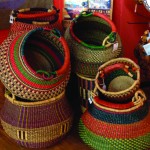
Laloca – a Global Local Market
by Carole Pearson
Sidney merchant Chris Downing isn’t really a “crazy woman.” While the name of her Beacon Avenue shop, Laloca, does mean exactly that in Spanish, it’s only coincidental. Downing says she wanted the name of her store to reflect the the variety of places her products come from. Thus she decided on “La” for Latin America, “lo” for local artisans, and “ca” for Caribbean countries but customers will find there’s merchandise from all over the world.
What makes Laloca different from most is only fair trade products are sold here. “I have a real commitment to fair trade,” Downing says. “The artisans deserve fair pay. We expect it for ourselves and we should expect it for others as well.”
What is fair trade? The Fair Trade Federation says, “Fair trade supports farmers and craftspeople in developing countries who are socially and economically marginalized.” They receive a fair price for their work which allows them to improve their standard of living and money also goes to support vital community education and health projects. It also means every item has a story to it.
Downing first became interested in fair trade issues through the work of the Artesania Sorata when she was in Bolivia. Artesania Sorata began as a co-operative of villagers and rural artisans and has grown into a business that provides work to over 150 indigenous families. They produce high quality woven wall hangings plus sweaters made from hand-spun wool.
“I really like the tenacity of the women there,” says Downing. “They’re up in the high Andes and produce this amazing art but face a real challenge to get their works to the international market.”
On her return to Canada, Downing continued to import items from the Artesania Sorata, storing them away. “I was just holding on to them, trying to figure out what I was going to do. You can only sell to your friends and family so many times.”
In November 2013, Downing booked a table at the annual Victoria International Development Education Association (VIDEA) Fair Trade Fair. She discovered there was great interest in her Bolivian crafts. Bolstered by this response, Downing decided to open a store.
In deciding what products to carry, Downing says, “They either have to be a member of the Fair Trade Federation or can show the things have a fairness attached to it and a good percentage goes back to the community.”
Downing also carries products made in BC, from fairly traded materials. “There are also struggling artisans in Canada so I believe we can throw the net wide.”
Laloca offers solid fragrance pots made in Kaslo, chocolate from Cumberland, and skincare products produced in Mill Bay using handmade raw shea butter from Ghana. There’s coffee that is imported directly from farmers and roasted and packaged in Central Saanich.
It’s all about supporting artisans, small businesses, and making a difference in the lives of others by where we spend our consumer dollars.
Find Laloca on Facebook
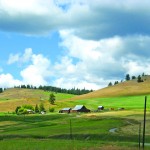
Leonard to Champion ALR
BC’s food security faces unprecedented pressures as ex-Saanich mayor takes the reins of the ALC
by Michele Murphy, photo by Ed Johnson
Frank Leonard is back in the news this past May as the BC Liberal government appointed him the new chair and interim CEO of the Agricultural Land Commission (ALC). The newly-defeated Saanich mayor comes to the new appointment without benefit of an agricultural background, but what he does have is experience juggling opposing priorities.
Leonard’s appointment comes on the heels of the controversial firing of passionate ALR champion Richard Bullock from the ALC board with just five months left to go on his contract.
The firing of Bullock has brought widespread objections and concerns from across the agricultural community, and many, including Bullock himself, say he was canned for doing the job of standing up for B.C.’s agricultural land too well.
The response from the agri-community was swift, passionate and critical. BC Agricultural Council chair, Stan Vander Waal, said that the council was sad to see Richard go and that “his knowledge of B.C. agriculture and his commitment to keep farmland for farming is second to none.”
Locally, the CRD’s food-security coalition, CR Fair, asked if Bullock’s firing was a result of him doing his job too well, while the chair of the Opposition Standing Committee for Agriculture and Food, Saanich South MLA Lana Popham, felt that the firing signified the BC Liberal government’s intent to continue the “war of BC’s agricultural land.”
“You really have to question what’s going on here,” she said. “Richard Bullock was widely respected by farmers across the province. Now he’s suddenly fired, without warning…. They didn’t like that the ALC chair was standing up for B.C.’s agricultural land, so they fired him. It’s that simple.”
The firing and hiring is part of a larger change-up to the protection and treatment of BC’s farmland. Bullock said in an interview with the Globe and Mail on May 14, 2015 that he was told that the government is headed in a different direction and that they thought they needed new leadership.
That different direction would be covered in Bill 24, the controversial new ALR legislation that was passed last year. Many, including the outspoken Bullock, feel that there has never been a larger threat to the much-coveted ALR act since the NDP government passed it through the legislature during its short tenure in the 70s.
The ALC act amendment bill sees the creation of regional boards to oversee regional planning as well as changes to the allowable land use of almost 90% of ALR land. It will
divide the ALR into two zones, and the commission will be required to provide more flexibility in land use in the larger zone allowing activities such as food processing and potential oil and gas development, including fracking. (Saanich and the Peninsula’s 16,800+ acres of ALR land all fall within zone one.)
Current Agriculture Minister Norm Letnik said he is comfortable that the new law will preserve farmland and ensure that “we have a strong ALC that is independent of politicians.” Others are not as comfy with it.
Richmond councillor and former NDP MLA, Harold Steves, considered to be the “Father of the ALR,” said of Bill 24, “It’s a way of gutting the Agricultural Land Reserve and pretending it’s still there.”
Bill 24 is not the only perceived threat to BC’s farmland. This spring it has come to light that thousands of hectares of BC farmland are being planted with trees to be used as carbon offsets by off-shore corporations. These carbon sinks include imposing a restrictive 100-year covenant on the ALR land. The ALC’s ability, and now willingness, to fight this or negate the loss of active food-producing land is in serious question.
To add to the list of ALR issues, the construction of the contentious Site C dam is scheduled to begin this summer amidst growing opposition to the project from several angles, not the least of which is the flooding of over 31,000 acres of agricultural land.
“I think we’ve got all sorts of things coming at us. First of all [is the pressure] to do all sorts of things on agricultural land that have absolutely nothing [to do] with agriculture and a lot to do with everything else…. And up there in the northeast, there’s huge issues with the oil and gas plays going on, on agricultural land,” said Bullock in his recent Globe interview
When asked to comment on the the multitude of pressures that the ALC will face, Leonard said, “I’m excited about the opportunity to do a great job for our province.”
Whether it’s the use of farmland for natural gas fracking, the pressures from industry and development to release ALR land, Site C, second-generation landowners wanting to develop urban farmland, the effects of California and Washington State droughts on BC’s food supply and costs (67 per cent of BC’s vegetables come from the US), or the new world of carbon offsets, Frank Leonard will have his hands full carrying out his mandate of preserving BC’s agricultural land and encouraging farming.
Juggling may be exactly the skill set that the new ALC chair needs.
-30-
FIND OUT MORE:
Harold Steves the Father of the ALR
Site C Dam: A Waste of Farmland
The BC Liberal Government Is Foolishly Moving To Allow Fracking On Farmland
Wake up Call: California Drought & B.C.’s Food Security
B.C. government fires outspoken chair of Agricultural Land Commission


